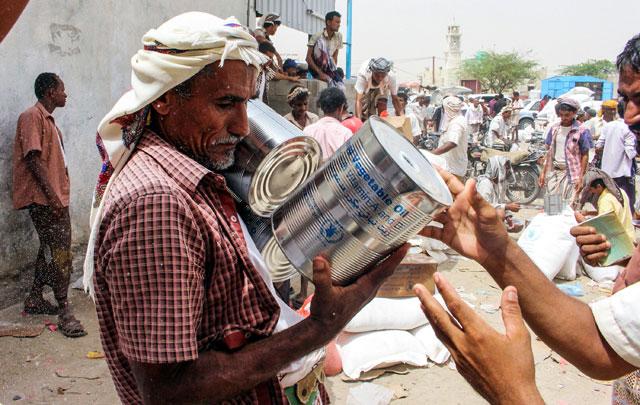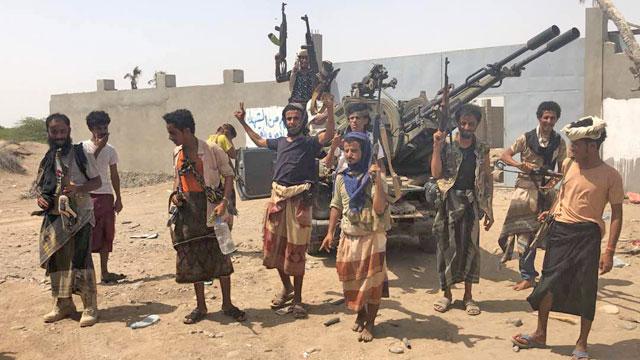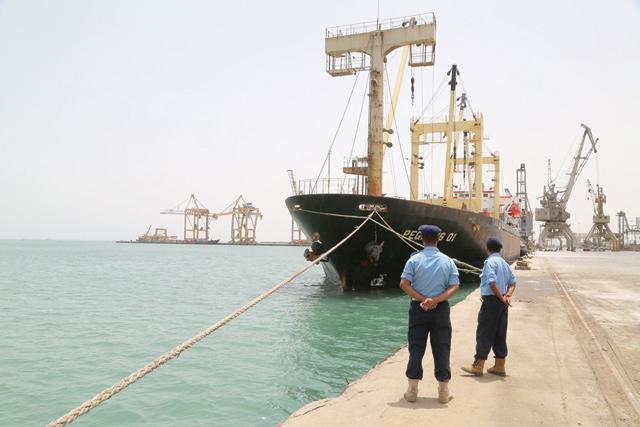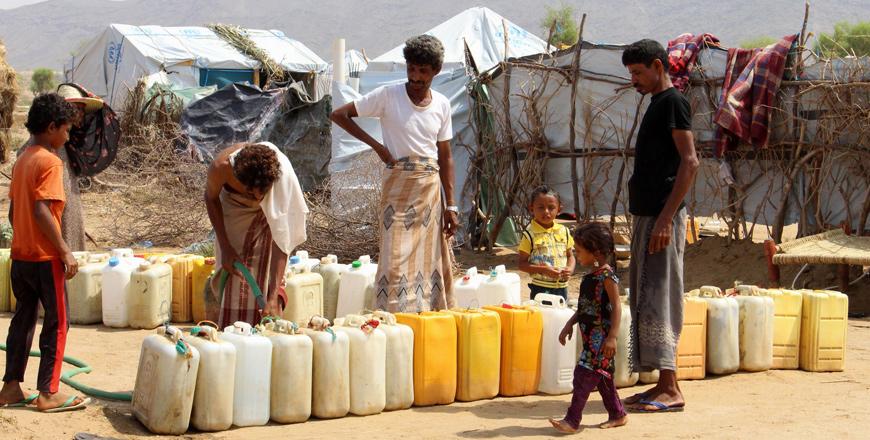You are here
Fighting moves closer to centre of Yemen’s main port city
By Reuters - Jun 24,2018 - Last updated at Jun 24,2018

A Yemeni civilian receives food aid for displaced people who fled battles in the Red Sea province of Hodeida and are now living in camps in the northern district of Abs, under control by the Iranian-backed Houthi rebels in Hajjah province, on Sunday (AFP photo)
ADEN, Yemen — Yemen’s Houthis deployed additional forces in the main port city of Hodeida on Sunday as a Saudi-led military coalition moved closer to the city centre in the largest offensive of the war, raising UN fears of a humanitarian catastrophe.
The alliance led by Saudi Arabia and the United Arab Emirates launched its assault on the heavily defended Red Sea city on June 12 to try to weaken the Iran-aligned Houthi movement by cutting off a key supply line for the group which controls the capital Sanaa and most populated areas.
“There is a heavy deployment of armed Houthis in the city and new check points have been set up in neighbourhoods where there are supporters of the Tehama brigades,” said one resident, referring to a Yemeni faction from the Red Sea coastal plain that is fighting with coalition forces.
Fierce clashes broke out after midnight near Hodeida University, around 3km west of the city centre, on the coastal road linking the airport to the port, added the resident, who requested anonymity.
Coalition forces seized the airport on Wednesday and have been consolidating their hold in the area as UN efforts continued to reach a political deal that would avert an assault on the port, a lifeline for millions of Yemenis.
The United Nations fears the escalation in fighting could exacerbate what is already the world’s most urgent humanitarian crisis, with 22 million Yemenis dependent on aid and an estimated 8.4 million believed to be on the verge of starvation.
The fighting has wounded and displaced civilians.
Medical charity Medecins Sans Frontieres said it had received 151 injured people in recent days in Al Thawrah Hospital, the main public medical facility serving Hodeida, and expects to receive more as the fighting moves towards the city.
“There are 86 beds in Al Thawrah and we desperately need more... We hope to set up a field hospital with 20 beds in the next two weeks,” Caroline Seguin, MSF programme manager for Yemen, told Reuters by telephone from the UAE.
The Western-backed coalition intervened in Yemen in 2015 to restore the internationally recognised government in exile, but since then neither side has made much progress in the war, widely seen as a proxy conflict between Saudi Arabia and Iran.
UN role
The World Food Programme said the fighting could result in up to 1.1 million people being either displaced or trapped within the city and in need of emergency food assistance.
UN envoy Martin Griffiths has visited Sanaa and Saudi Arabia to try to negotiate a solution.
The Houthis have indicated they would be willing to hand over management of the port to the United Nations, sources told Reuters. A US official said Washington was urging the Saudis and Emiratis to accept the deal.
“The coalition will achieve its goal of liberating Hodeida, city and port. Yet we will support all efforts to achieve an unconditional peaceful withdrawal of Houthi gangs,” UAE Minister of State for Foreign Affairs Anwar Gargash said in a Twitter post on Saturday.
The Arab states say they must recapture Hodeida to deprive the Houthis of their main source of income and prevent them from smuggling in Iranian-made missiles, which have been launched at Saudi cities. The group and Tehran deny the accusations.
The coalition has pledged a swift military operation to take over the airport and seaport without entering the city centre, to minimise civilian casualties and maintain the flow of goods.
“The battle for Hodeida is reaching the point of no return,” the International Crisis Group said in a conflict alert.
“This is the final, fragile moment in which it may still be possible for UN-led negotiations to prevent a destructive fight that is likely to exacerbate dire humanitarian conditions and further delay broader negotiations to end the war.”
Related Articles
ADEN, Yemen — Arab coalition troops stormed the airport in Yemen’s main port Hodeida on Tuesday and captured large areas of the compound in
ADEN — Yemen's warring parties started fresh UN-sponsored talks in Jordan on Monday, Yemeni officials said, two days after Houthi forces beg
ADEN — Saudi-backed government forces in Yemen launched a series of attacks on rebel-held Hodeida, military officials said Tuesday, raising



















